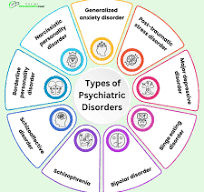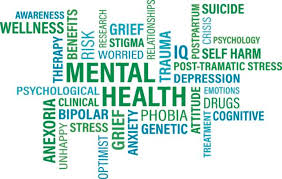Understanding Psychiatric Illness: Causes, Symptoms, and Treatment
Psychiatric illness, also known as mental illness, refers to a wide range of conditions that affect a person’s thinking, feeling, behavior, or mood. These conditions can significantly impact an individual’s daily functioning and quality of life. Understanding psychiatric illness is crucial in order to provide proper support and treatment to those affected.
Causes of Psychiatric Illness
The causes of psychiatric illness are complex and can vary from person to person. Factors such as genetics, brain chemistry, traumatic life experiences, and environmental stressors can all play a role in the development of mental health disorders. Additionally, certain medical conditions or substance abuse can also contribute to the onset of psychiatric illness.
Common Symptoms
The symptoms of psychiatric illness can manifest in different ways depending on the specific disorder. However, some common symptoms include persistent sadness or anxiety, changes in sleep patterns or appetite, difficulty concentrating, withdrawal from social activities, mood swings, and thoughts of self-harm or suicide. It is important to seek help if you or someone you know is experiencing these symptoms.
Treatment Options
Fortunately, there are effective treatments available for psychiatric illnesses. These may include psychotherapy (talk therapy), medication management, lifestyle modifications (such as exercise and stress reduction techniques), and in some cases, hospitalization for severe cases. It is essential for individuals with psychiatric illnesses to work closely with healthcare professionals to determine the most appropriate treatment plan for their specific needs.
Breaking the Stigma
One of the biggest challenges faced by individuals with psychiatric illnesses is the stigma associated with mental health disorders. This stigma can prevent people from seeking help due to fear of judgment or discrimination. It is crucial for society to break down these barriers and promote open discussions about mental health in order to create a more supportive and understanding environment for those affected by psychiatric illnesses.
Conclusion
Psychiatric illness affects millions of people worldwide and should be treated with the same level of care and compassion as physical illnesses. By increasing awareness, understanding the causes and symptoms, exploring treatment options, and breaking down stigmas surrounding mental health disorders, we can create a more inclusive society where individuals with psychiatric illnesses feel supported on their journey towards healing and recovery.
6 Essential Tips for Managing Psychiatric Illness: A Guide to Support and Recovery
- Seek professional help if you are experiencing symptoms of a psychiatric illness.
- Educate yourself about the specific psychiatric illness you are dealing with.
- Practice self-care activities such as exercise, meditation, and hobbies to manage symptoms.
- Build a support system of friends, family, or support groups to provide emotional support.
- Follow your treatment plan consistently, including medication and therapy if prescribed.
- Be patient with yourself and remember that recovery from psychiatric illness takes time.
Seek professional help if you are experiencing symptoms of a psychiatric illness.
It is crucial to seek professional help if you are experiencing symptoms of a psychiatric illness. Mental health professionals are trained to assess, diagnose, and provide appropriate treatment for various mental health conditions. By reaching out for support, you can receive the necessary guidance and care to address your symptoms effectively and improve your overall well-being. Remember that seeking help is a sign of strength and courage, and it can lead to better outcomes in managing psychiatric illnesses.
Educate yourself about the specific psychiatric illness you are dealing with.
To effectively navigate and address psychiatric illness, it is essential to educate yourself about the specific mental health condition you or a loved one is facing. Understanding the symptoms, triggers, treatment options, and coping strategies associated with the psychiatric illness can empower you to make informed decisions and provide better support. By gaining knowledge about the specific disorder, you can enhance communication with healthcare providers, advocate for appropriate care, and foster a deeper sense of empathy and understanding towards those experiencing psychiatric challenges. Education serves as a vital tool in breaking down stigma, promoting self-care, and ultimately improving the overall well-being of individuals affected by mental health conditions.
Practice self-care activities such as exercise, meditation, and hobbies to manage symptoms.
Engaging in self-care activities such as exercise, meditation, and hobbies can be incredibly beneficial in managing symptoms of psychiatric illness. Regular physical activity not only improves overall health but also releases endorphins that can boost mood and reduce feelings of anxiety or depression. Meditation helps calm the mind, reduce stress, and promote mental clarity. Additionally, pursuing hobbies that bring joy and fulfillment can provide a sense of purpose and distraction from negative thoughts. By incorporating these self-care practices into daily routines, individuals with psychiatric illness can proactively take steps towards improving their well-being and managing their symptoms effectively.
Build a support system of friends, family, or support groups to provide emotional support.
Building a strong support system of friends, family, or support groups is a valuable tip for managing psychiatric illness. Having a network of individuals who can provide emotional support, understanding, and encouragement can make a significant difference in one’s mental health journey. These supportive relationships can offer comfort during difficult times, help reduce feelings of isolation, and provide a sense of belonging and connection. By surrounding oneself with caring and empathetic individuals, those dealing with psychiatric illness can feel more empowered to navigate their challenges and work towards healing and recovery.
Follow your treatment plan consistently, including medication and therapy if prescribed.
Following your treatment plan consistently, which may include medication and therapy if prescribed, is crucial in managing psychiatric illness effectively. Adhering to the recommended course of treatment can help stabilize symptoms, improve overall well-being, and enhance your quality of life. Medication and therapy work synergistically to address the underlying causes of mental health disorders and provide the necessary support for recovery. By staying committed to your treatment plan, you are taking proactive steps towards better mental health and a brighter future.
Be patient with yourself and remember that recovery from psychiatric illness takes time.
It is important to be patient with yourself and acknowledge that recovery from psychiatric illness is a gradual process that takes time. Healing from mental health challenges requires patience, self-care, and consistent effort. Remember to celebrate small victories along the way and understand that setbacks are a natural part of the journey. By being kind and compassionate to yourself, you can navigate the ups and downs of recovery with resilience and determination.



